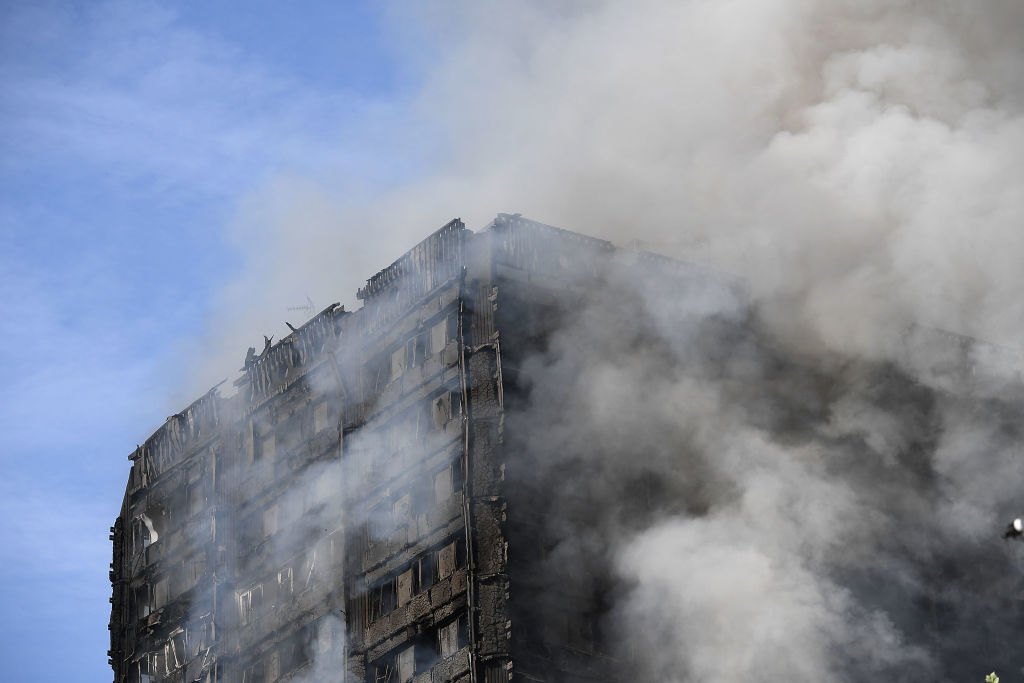It takes a lot to make me feel ashamed of London, my beloved home city. But yesterday’s tower-block inferno did it. The raging fire at Grenfell Tower in North Kensington, the disturbing speed with which this home to hundreds was reduced to a smouldering shell of a building, heaps shame on this city. It is positively Dickensian, a hellish scene out of place in 2017, like a violent echo from an older era when safety, especially the safety of the poor, was of little moment. London needs to look in the mirror. This cannot just be chalked up to ‘tragedy’.
It is difficult to avoid the conclusion that it was the low social status of the inhabitants of the tower that left them vulnerable to this horror. That’s a serious charge, I know, but how else do we explain that residents who complained about fire hazards were ignored? The Grenfell Action Group residents’ association complained to the Kensington and Chelsea Tenant Management Organisation (KCTMO) — which manages Grenfell — about ‘terrifying power surges’ caused by ‘faulty wiring’. It predicted that only a ‘serious fire in a tower block’ would lead to KCTMO being ‘brought to justice’. It remains to be seen how neglectful KCTMO was, if it was at all, but it is profoundly concerning that residents say their complaints were ignored. Their worries ‘fell on deaf ears’, they say. It’s hard to imagine the residents of one of Kensington’s plusher, more pleasing-to-the-eye builds being treated like this. There are many specific questions that must be asked — and answered — about this horrific fire. Most pressingly: how did a fire in one flat spread with such ferocious speed to the entire block? A flat-based fire can be a simple accident (though we don’t yet know if this fire was accidental or deliberate). But when such a fire moves upwards and upwards with nightmarish intensity, engulfing home after home, it’s not an accident. Then it becomes something else; then it becomes clear that the fire has been enabled by something, perhaps by the decisions and actions of others. In this case, recent refurbishment, including the addition of seemingly flammable cladding, raises serious questions about materials used on buildings and official fire regulations. Also, why don’t all tower blocks have sprinklers? And decent fire alarms that can actually be heard? These specific issues must be pored over, urgently, post this inferno. But there are broader questions, too. Most importantly, there’s the housing crisis, the dearth of new build, and how this has helped to warp the housing market so that homes in Britain, and especially in London, are pretty much unaffordable to normal people. The failure of both Tory and Labour governments to build the millions of new homes Britain needs has messed up the economy and society in ways we sometimes fail to appreciate. Bank of England governor Mark Carney was right to warn in 2014 that ‘there are not sufficient houses [being] built in the UK’, and that this lack, this dearth, is ramping up house prices, intensifying borrowing, and storing up serious problems for ‘financial durability’.But the housebuilding failure hasn’t only twisted prices and blown up economic bubbles — it has also had a dire impact on society, too, on community life, even on the value we attach to certain citizens. It has created a situation where developers, and the local councils who love them, tend always to have the super-rich in mind; tend to erect new builds they know will be snapped up by those flush with cash: wealthy foreigners or filthy-rich Brits. In the midst of this market-lighted process of gentrification, the poorer inhabitants of places like Kensington and Chelsea sometimes come to be seen as a pain, as squatters almost, whose towering blocks or state-funded homes are in essence vast concrete barriers to the making of huge amounts of money.
And so do the poorer inhabitants of certain boroughs come to be seen, inexorably, as a problem, as pests, their concerns easily ignored. After all, wouldn’t it be better if they left? If they cleared the way for new opportunities for wealth creation for the few? This is the inhumanity unwittingly unleashed by our warped housing crisis, and by the recession more broadly, and it is, if you will forgive me, disgusting. Since that benighted building and the family homes it contains went up in flames 24 hours ago, there has been a rush to pin the blame on ‘evil’ individuals. We’ve seen an outburst of Tory-bashing in particular. Boris is to blame, for cutting fire services. Gavin Barwell, Theresa May’s new chief-of-staff, is also getting it in the neck for having allegedly ‘sat on’ a report about how tower blocks are vulnerable to fire. This craven search for the one evil Tory to blame for this calamity is also Dickensian. It’s a Dickensian breed of moralism that prefers to bash wicked individual landlords or nasty Scrooges rather than address the bigger social and economic underpinnings of tragedies like this. Finger-pointing and the desire to feel good and pompous become a substitute for examining how both Tory and Labour governments have helped to warp the housing question through their failures of housing ambition. I was born into overcrowded social housing in West London, not far from Grenfell. So I know something of how social-housing residents are mistreated, how they can come to be viewed as lesser citizens than those with money and influence, whether it’s by Labourites hectoring them for their ‘nasty neighbour’ behaviour or the rich wishing they would move on. It must stop. We have it in our power to ensure that nothing like the Grenfell fire ever happens again, if we ask the right and hard questions.






Comments